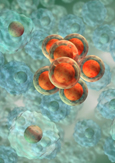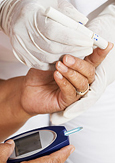
Life Sciences
Major international breakthroughs
 Québec has earned a reputation as a centre of excellence in the life sciences: we have made great contributions to biomedical research in many of the fields most relevant to today’s health challenges. Here are some of our researchers’ recent discoveries:
Québec has earned a reputation as a centre of excellence in the life sciences: we have made great contributions to biomedical research in many of the fields most relevant to today’s health challenges. Here are some of our researchers’ recent discoveries:
-
A new molecule allows for an increase in stem cell transplants
Investigators from the Institute for Research in Immunology and Cancer (IRIC) at the University of Montréal have discovered a new molecule, the first of its kind, which allows for the multiplication of stem cells in a unit of cord blood. Umbilical cord stem cells are used for transplants aimed at curing a number of blood-related diseases, including leukemia, myeloma and lymphoma. For many patients, this therapy is used as a last resort. Directed by Dr. Guy Sauvageau, principal investigator at IRIC and hematologist at the Maisonneuve-Rosemont Hospital, this world breakthrough has the potential to multiply by 10 the number of cord blood units available for a transplant in humans. In addition, it will considerably reduce the complications associated with stem cell transplantation. And it will be particularly useful for non-Caucasian patients for whom compatible donors are difficult to identify.
(IRIC) at the University of Montréal have discovered a new molecule, the first of its kind, which allows for the multiplication of stem cells in a unit of cord blood. Umbilical cord stem cells are used for transplants aimed at curing a number of blood-related diseases, including leukemia, myeloma and lymphoma. For many patients, this therapy is used as a last resort. Directed by Dr. Guy Sauvageau, principal investigator at IRIC and hematologist at the Maisonneuve-Rosemont Hospital, this world breakthrough has the potential to multiply by 10 the number of cord blood units available for a transplant in humans. In addition, it will considerably reduce the complications associated with stem cell transplantation. And it will be particularly useful for non-Caucasian patients for whom compatible donors are difficult to identify. -
Major leap forward in cancer research
Professor Sylvain Martel, Director of the Polytechnique Montréal Nanorobotics Laboratory , and a team of researchers from Polytechnique Montréal, University of Montréal and McGill University have achieved a major leap forward in cancer research by developing new nanorobotic agents able to navigate through the bloodstream to administer a drug with precision by specifically targeting the active cells of cancerous tumours. And this without the usual side effects of chemotherapy.
, and a team of researchers from Polytechnique Montréal, University of Montréal and McGill University have achieved a major leap forward in cancer research by developing new nanorobotic agents able to navigate through the bloodstream to administer a drug with precision by specifically targeting the active cells of cancerous tumours. And this without the usual side effects of chemotherapy. -
Important discovery for treating narrowing of the aortic valve
Dr. Jean-Claude Tardif and his team have discovered that administering a new type of drug that raises HDL—the so-called “good” cholesterol—leads to a reduction in aortic valve narrowing in patients with aortic valve stenosis. This new approach could offer many patients an alternative to open-heart surgery. -
A guide for travelling through the brain
BigBrain is the name of an extremely high-resolution 3D graphic representation of the brain developed by brain-imaging specialist Alan C. Evans and his colleagues at the Montréal Neurological Institute and Hospital, in partnership with a team at the Jülich Research Centre, in Germany. Fifty times more precise than the maps produced by magnetic resonance imaging, BigBrain has a resolution of 20 micrometres – close to the size of a cell.
Neuroscience and aging
Montréal researchers make discovery about Alzheimer’s diseaseExpand/Collapse
According to a recent Montréal study, Alzheimer’s disease is accelerated by an abnormal build-up of fat in the brain. This discovery paves the way for new diagnostic avenues and testing of drugs to control fat levels in other parts of the body. Researchers at the University of Montréal Hospital Research Center (CRCHUM) discovered fatty deposits in the brains of nine patients who died from Alzheimer’s and in those of genetically modified mice used as test models. The mapping of fat distribution in the brain has only recently become possible, thanks to a mass spectrometry technique used by chemists at the University of Montréal.
A blood test to screen for Alzheimer’s diseaseExpand/Collapse
Dr. Judes Poirier, one of the world’s leading experts on treatments for Alzheimer’s and Parkinson’s diseases, and Vassilios Papadopoulos, Director of the Research Institute of the McGill University Health Centre, have developed a reliable, inexpensive diagnostic test to detect early-stage Alzheimer’s disease. The blood test uses oxidation and measures the amount of DHEA present in the blood. While diagnosing Alzheimer’s remains a complex problem, this test will aid in large-scale identification of potential sufferers.
Reversing the consequences of chronic painExpand/Collapse
Chronic pain can be so disruptive that it causes changes in the brain, producing a thinning of the grey matter, which may lead to cognitive disorders. McGill University researchers Laura Stone and David Seminowicz have developed an effective treatment to slow these changes and even significantly reverse damage to the frontal lobe of the brain!
A spectacular advance in nanomedicineExpand/Collapse
 Oncologists dream of being able to target cancer cells precisely while sparing healthy cells from exposure to the toxic effects of drugs. That dream will soon be a reality!
Oncologists dream of being able to target cancer cells precisely while sparing healthy cells from exposure to the toxic effects of drugs. That dream will soon be a reality!
The team led by Sylvain Martel, Director of the École Polytechnique de Montréal’s NanoRobotics Laboratory, has developed a technique that uses remote-controlled microcarriers to deliver cancer drugs to the exact site of the tumour.
A smart gel that attacks cancerExpand/Collapse
The University of Montréal Hospital Research Center (CRCHUM) has developed a biogel that shows promise in the fight against cancer, delivering anti-cancer agents directly into cancer tumours and killing them. The biogel has the tremendous advantage of being liquid at room temperature. It gels at 37 degrees Celsius, which is the normal human body temperature. Also, it is compatible with T cells, anti-cancer immune cells that are naturally produced by the body and able to destroy cancer cells. Though still in its early stages, the biogel brings hope for the treatment of cancer.
Ovarian cancer - the great pretender is exposedExpand/Collapse
A research team from the McGill University Health Centre (MUHC), led by Dr. Lucy Gilbert, discovered that the most deadly type of ovarian cancer often starts in the Fallopian tubes rather than in the ovaries. The discovery could revolutionize the way this disease is diagnosed and treated.
A world first in stem-cell researchExpand/Collapse
The multidisciplinary team directed by Guy Sauvageau has made a giant leap forward in stem-cell research by producing large quantities of stem cells in the laboratory. That’s good news for patients waiting for a bone marrow transplant! In fact, all signs indicate that, in a few years, more such operations will be possible. Moreover, this discovery could aid in the treatment of conditions such as Alzheimer’s disease and diabetes.
Lifestyle diseases (cardiovascular diseases, diabetes and obesity)
Montréal discovery has world-wide impactExpand/Collapse
Montréal is at the heart of a major medical discovery. For the first time, patients with heart disease have responded to a drug according to their genetic profile. To demonstrate the validity of this promising treatment, which is called dalcetrapib, the Montréal Heart Institute (MHI) launched an international clinical trial. This unique study puts Montréal and its scientists at the forefront of international research. To determine the drug’s reliability, a large-scale phase III study will be carried out over the next few years, enrolling a total of 5,000 patients across 1,000 centers in 33 countries. According to Dr. Jean-Claude Tardif, Director of the MHI Research Centre, should the study prove conclusive, it will mark the beginning of a new chapter for personalized medicine in cardiology – much like genes revolutionized the treatment of certain types of cancer.
Understanding diseases better via geneticsExpand/Collapse
 Brent Richards and his team have discovered a new genetic marker for coronary heart disease and the risk of type 2 diabetes. Their findings are the result of collaborations with international consortiums aimed at identifying the genetic determinants of these conditions.
Brent Richards and his team have discovered a new genetic marker for coronary heart disease and the risk of type 2 diabetes. Their findings are the result of collaborations with international consortiums aimed at identifying the genetic determinants of these conditions.
Genomics and proteomics
A revolution in neurologyExpand/Collapse
 Researchers Yves De Koninck of Laval University and Yoan LeChasseur and Réal Vallée of Centre d’optique, photonique et laser have developed the finest fibre optic in the world.
Researchers Yves De Koninck of Laval University and Yoan LeChasseur and Réal Vallée of Centre d’optique, photonique et laser have developed the finest fibre optic in the world.
Their instrument not only illuminates brain cells, it can analyze and even control them! This revolutionary tool is part of a brand new neurological discipline called “optogenetics.”
Personalized medicine
Québec sets its sights on precision medicineExpand/Collapse
 Precision medicine (personalized medicine) holds considerable promise for the future, and Québec has everything it takes to make that goal a reality:
Precision medicine (personalized medicine) holds considerable promise for the future, and Québec has everything it takes to make that goal a reality:
- solid capabilities in scientific research, genomics and proteomics;
- high-tech research centres;
- major projects involving tissue banks and databases, including the CARTaGENE project.
Precision medicine soon to be incorporated into medical and clinical practices
Québec is a forerunner in genomics. In the past five years, more than $450 million have been invested in personalized health care research partnerships by the private sector, as well as the federal and provincial governments.
Over the next seven years, Québec will also invest $75 million in major partnerships and initiatives, including some in precision medicine.
The Exactis Innovation Centre of Excellence in Precision Therapeutics aims to develop cancer treatments that are increasingly personalized by combining the latest discoveries in cancer biology with new approaches to clinical research.
The Personalized Medicine Partnership for Cancer is an organization that develops and tests new biomarkers for doctors who treat cancer patients.
The Québec – Clinical Research Organization in Cancer (Q-CROC) is a provincial interface for clinical research, bridging the gap between industry, government, healthcare establishments and the research community.
The Québec Network for Personalized Health Care (QNPHC) brings together stakeholders who share an interest or work in personalized health care, including academic researchers, clinicians, private companies (pharmaceutical, biotechnology, health technologies, insurers, etc.), public organizations, patient groups and opinion leaders.
Other
sites
Productivité innovation website (in French only)
Compétivert(in French only)







